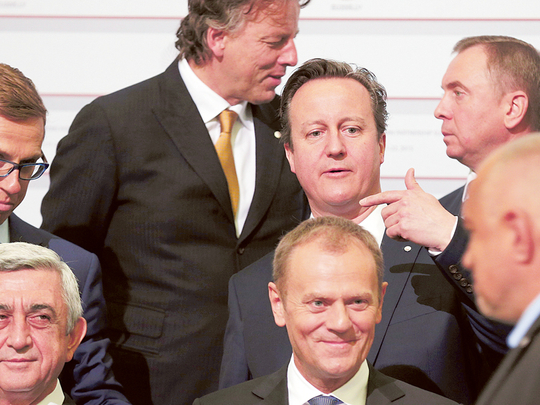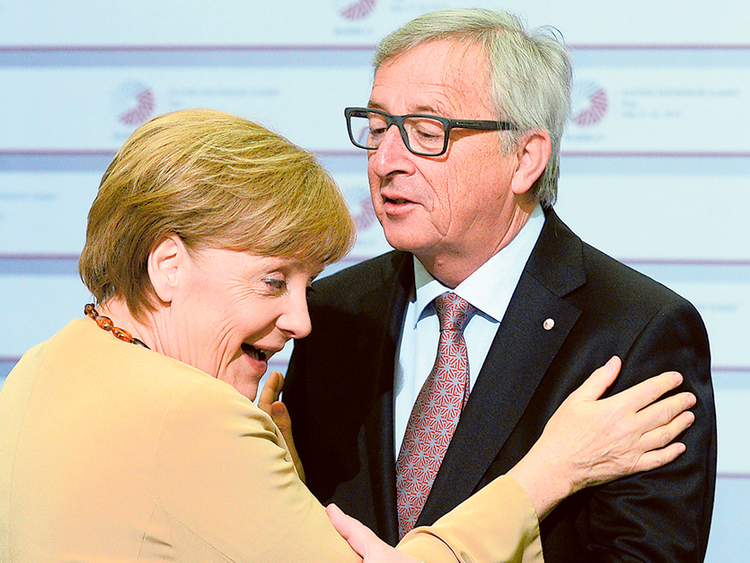
Riga: Prime Minister David Cameron launched his bid to recast Britain’s relationship with the European Union (EU) on Friday, warning of “ups and downs” before a straight in or out referendum by the end of 2017.
On his first overseas trip since winning a general election two weeks ago, Cameron kicked off months of negotiations to persuade other European leaders of the need for reforms which he says will require treaty change.
“One thing throughout all of this that will be constant, is my determination to deliver for the British people,” Cameron told reporters at a summit of the 28-nation bloc and six former Soviet states in Riga.
“But there will be lots of noise, lots of ups and downs, along the way.”
Cameron’s preliminary talks with a string of leaders will be followed by a spell of intense diplomacy next week.
He will host European Commission head Jean-Claude Juncker at his country residence, Chequers, on Monday, before travelling to Paris and Berlin for talks on Thursday and Friday respectively.
In Riga, Cameron met leaders including Poland’s Ewa Kopacz and Hungary’s Viktor Orban for brief, general discussions on his reform agenda, British officials said.
“It was a pitch about why these issues matter to the British people, why he needs to address them, broader concerns around immigration, the direction of the EU,” one official added, speaking on condition of anonymity.
But French President Francois Hollande said he had not spoken to Cameron about the issue.
“It was not the place and it was not the time,” Hollande added, highlighting that the two would meet next week.
Cameron promised two years ago to hold a referendum on leaving Europe by the end of 2017 under pressure from Euro-sceptics in his centre-right Conservative party and rising support for the anti-EU UK Independence Party.
He will campaign to stay in as long as he can secure reforms such as making it harder for EU migrants to claim state benefits in Britain.
Opinion polls currently suggest Britons will back staying part of the EU.
Britain is a member of the EU, but has kept its own currency, the pound, rather than adopting the euro and is not part of the Schengen Area, the group of 26 European countries, which have abolished passport and border controls at common borders.
The main focus of the summit was on developing the EU’s relationship with the former Soviet states of Armenia, Azerbaijan, Belarus, Georgia, Moldova and Ukraine.
European leaders reaffirmed the “high importance” of building stronger relations with the states.
EU president Donald Tusk said afterwards that the EU would be a “partner for the long haul”, while insisting it would not lead to automatic EU membership.
“Nobody promised that the Eastern Partnership would be automatically the way to membership of the EU ... it will be a long process,” he said.
That echoed comments made by German Chancellor Angela Merkel, who has led talks on peace in Ukraine with Russia and insisted Thursday that the Eastern Partnership project is “not an instrument” for enlarging the EU.
The summit declaration also urged the full implantation of the Minsk peace accords and reaffirmed its position on the “illegal annexation” of Crimea by Russia last year.
The leaders met following a 2013 summit, which ended in chaos when Ukraine’s then president, pro-Russian Viktor Yanukovych, baulked at signing an EU association accord alongside Georgia and Moldova.
His refusal sparked massive pro-EU protests that led to his expulsion in February 2014, then to Russia’s annexation of Crimea and a bloody conflict in eastern Ukraine.
Ukraine’s current pro-Western President Petro Poroshenko completed the agreement last year and wants ultimately to join the EU but this is a long-term objective at best.
Around 50 people from Ukraine and Georgia held a protest urging the EU to speed up the process for their countries to join the bloc.
“It’s another chance to state that we are here, we would like to join the EU family and we are ready to be there,” one Georgian, Viktor Baramania, said.
Greece’s precarious debt bailout was also on the agenda as Prime Minister Alexis Tsipras’s leftist government races to obtain fresh funding from international creditors demanding more austerity measures before a June deadline.
Following talks between Tsipras, Merkel and Hollande on Thursday, the German chancellor said there was “still a lot to do” in the negotiations.
Greek government spokesman Gabriel Sakellaridis told Skai TV on Friday that a deal was possible by the end of the month.
European Commission head Jean-Claude Juncker teased Hungarian Premier Viktor Orban over his strongman reputation on Friday, jokingly greeting him as “dictator” as he arrived at an EU summit in Riga.
The right-wing Orban has angered and infuriated his EU peers for years, carrying out sweeping constitutional and institutional changes that critics say have curbed press freedom and judicial authority.
“Hello, dictator,” Juncker was overheard to say to Orban in front of the press at the EU-Eastern Partnership summit in Latvia.
Reporters said they had not been able to hear what Orban had said in reply, if anything, but Juncker was clearly in a playful mood as he received EU leaders alongside EU president Donald Tusk and Latvian Prime Minister Laimdota Straujuma.
Juncker also chided Greek Prime Minister Alexis Tsipras for his dress sense, with the left-winger declining to wear a tie as usual.
The dictator jibe from Juncker recalled a bitter row caused by US Republican Senator John McCain who labelled Orban a “neo-fascist dictator” in December last year. Orban called McCain’s remarks an “attack on national independence”.
The Hungarian leader again angered EU lawmakers and officials this week by insisting that Budapest had the right to debate closing the door to migrants and reintroducing the death penalty.
“Hungarians talk straight about tough things. We don’t like to beat about the bush. We are a frank people,” Orban said on a visit to the European Parliament in Strasbourg on Tuesday.
Officials in Juncker’s office said they had not heard what he had said to Orban.













